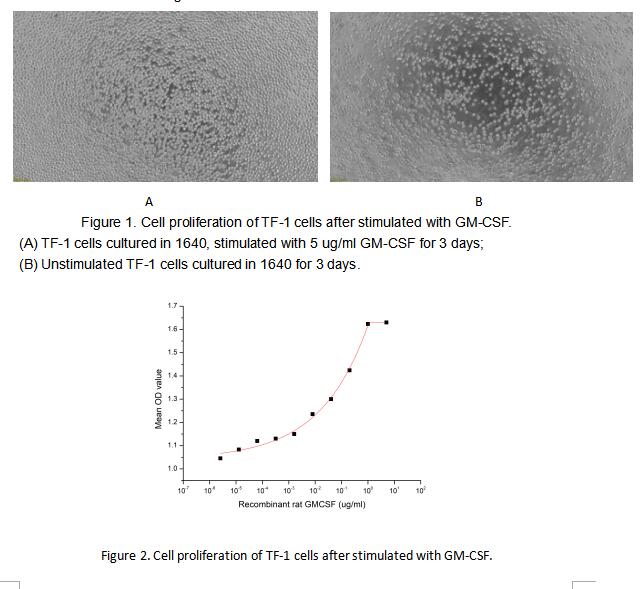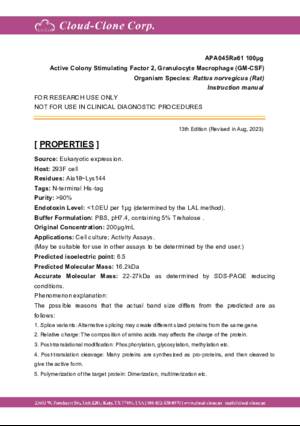Active Colony Stimulating Factor 2, Granulocyte Macrophage (GM-CSF)
CSF2; GMCSF; Sargramostim; Molgramostin; Granulocyte-Macrophage Colony Stimulating Factor
- Product No.APA045Ra61
- Organism SpeciesRattus norvegicus (Rat) Same name, Different species.
- Buffer FormulationPBS, pH7.4, containing 5% Trehalose.
- Traits Freeze-dried powder
- Purity> 90%
- Isoelectric Point6.5
- ApplicationsCell culture; Activity Assays.
- DownloadInstruction Manual
- UOM 10µg50µg 200µg 1mg 5mg
- FOB
US$ 232
US$ 580
US$ 1160
US$ 3480
US$ 8700
For more details, please contact local distributors!
ACTIVITY TEST

Granulocyte-macrophage colony-stimulating factor (GM-CSF), also known as colony-stimulating factor 2 (CSF2), is a monomeric glycoprotein that functions as a cytokine. it is a white blood cell growth factor. GM-CSF also has some effects on mature cells of the immune system. These include, for example, inhibiting neutrophil migration and causing an alteration of the receptors expressed on the cells surface. Besides, the proliferation of TF-1 cell line GM-CSF basic-dependent, thus, the activity of GM-CSF is usually measured by a cell proliferation assay using TF-1 cells. TF-1 cells were seeded into triplicate wells of 96-well plates with various concentrations of recombinant rat GM-CSF. After incubated for 3 days, cells were observed by inverted microscope and cell proliferation was measured by Cell Counting Kit-8 (CCK-8). Briefly, 10 µl of CCK-8 solution was added to each well of the plate, then the absorbance at 450 nm was measured using a microplate reader after incubating the plate for 2-4 hours at 37 ℃. Proliferation of TF-1 cells after incubation with GM-CSF for 3 days observed by inverted microscope was shown in Figure 1. Cell viability was assessed by CCK-8 (Cell Counting Kit-8 ) assay after incubation with recombinant rat GM-CSF for 3 days. The result was shown in Figure 2. It was obvious that GM-CSF significantly increased cell viability of TF-1 cells. The ED50 is 0.06 ug/ml.
USAGE
Reconstitute in 10mM PBS (pH7.4) to a concentration of 0.1-1.0 mg/mL. Do not vortex.
STORAGE
Avoid repeated freeze/thaw cycles. Store at 2-8°C for one month. Aliquot and store at -80°C for 12 months.
STABILITY
The thermal stability is described by the loss rate. The loss rate was determined by accelerated thermal degradation test, that is, incubate the protein at 37°C for 48h, and no obvious degradation and precipitation were observed. The loss rate is less than 5% within the expiration date under appropriate storage condition.
GIVEAWAYS
INCREMENT SERVICES
-
 BCA Protein Quantification Kit
BCA Protein Quantification Kit
-
 Molecular Mass Marker for Protein
Molecular Mass Marker for Protein
-
 Monoclonal Antibody Customized Service
Monoclonal Antibody Customized Service
-
 Polyclonal Antibody Customized Service
Polyclonal Antibody Customized Service
-
 Protein Activity Test Experiment Service
Protein Activity Test Experiment Service
-
 Electrophoretic Mobility Shift Assay (EMSA) Experiment Service
Electrophoretic Mobility Shift Assay (EMSA) Experiment Service
-
 Buffer
Buffer
-
 Lentivirus Packaging Experiment Service
Lentivirus Packaging Experiment Service
-
 Adenovirus Packaging Experiment Service
Adenovirus Packaging Experiment Service
-
 Real Time PCR Experimental Service
Real Time PCR Experimental Service
-
 Spike RBD Protein (S-RBD)
Spike RBD Protein (S-RBD)
-
 Protein G
Protein G
-
 Protein A
Protein A
| Magazine | Citations |
| Journal of Toxicology and Environmental Health | Effects of 900-MHz Microwave Radiation on γ-Ray-Induced Damage to Mouse Hematopoietic System PubMed: 20391130 |
| 5 | Safety and efficacy of the peptide-based therapeutic vaccine for HIV-1, Vacc-4×: a phase 2 randomised, double-blind, placebo-controlled trial Pubmed:24525316 |
| Archives of Virology | Genetic and immunogenicity analysis of porcine circovirus type 2 strains isolated in central China Pubmed:29305646 |
| BioMed Research International | Activated Macrophages of Monocytic Origin Predominantly Express Proinflammatory Cytokine Genes, Whereas Kupffer Cells Predominantly Express Anti … |
| bulletin of experimental biology and medicine | Quantitative and Qualitative Characterization of Phagocytic Activity of Macrophages of Bone Marrow and Fetal Origin Pubmed: 31183654 |
| Exp Mol Pathol | The regulatory role of SFRP5/WNT5A axis in allergic rhinitis through inhibiting JNK pathway activation and lowering mucin generation in human nasal?¡ 33285209 |
| Vaccine | Co-delivery of PSMA antigen epitope and mGM-CSF with a cholera toxin-like chimeric protein suppressed prostate tumor growth via activating dendritic cells and?¡ 33612342 |







